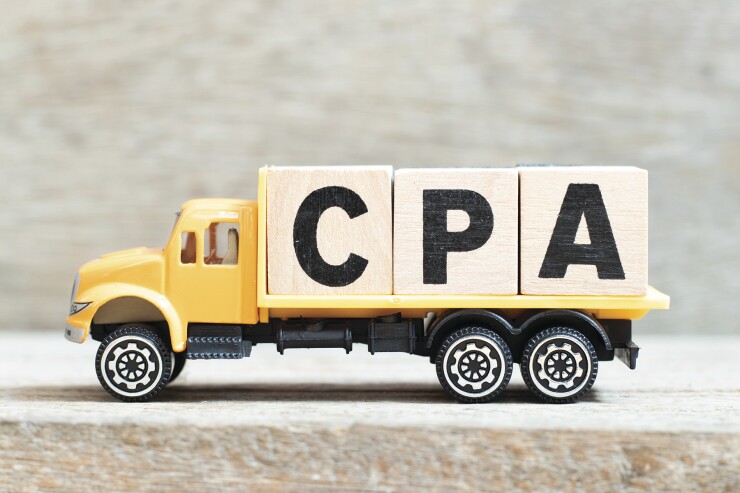The ongoing staffing shortage is forcing the accounting profession to do some soul searching. Numerous factors contribute to the pipeline problem, including declining birth rates, a decreasing emphasis on college education, and fewer students majoring in accounting, to say nothing of entry-level salaries that can’t compete with those on offer in a number of other careers.
But of all the factors, the 150-credit hour requirement for CPA licensure has become something of a flashpoint, and has come to be emphasized as particularly prohibitive, which is now raising questions regarding what it takes and means to be a CPA today.
Three primary issues arise with the 150-hour rule: cost, time and lack of structure.
For starters, the cost of the extra year of education isn’t worth the starting salary into which accounting students are graduating. Young accountants are effectively paying more to make less.
According to a 2023 study by the Center for Audit Quality, 61% of nonaccounting majors cited higher starting salaries with other majors as a reason for not choosing to study accounting. Additionally, 57% said they did not want to pursue the fifth year of education required for CPA licensure, and 52% said they could not afford 150 hours and needed to start earning immediately after graduation.
Accounting starting salaries have not kept pace with neighboring professions and industries, like finance and technology. Students can graduate into higher-paying jobs with the same level or education, or less, than is required to start a career in accounting.
“If you just took [the Consumer Price Index] and applied it to the starting salary back in 1982, you’re very close to the starting salary of what the fifth-year students were a year ago, so the profession really hasn’t caught up,” said Edward Wilkins, an accounting professor and former audit partner at a Big Four firm. “Did they ever really get credit for that fifth year if it was just a CPI adjustment?”
The second issue is time. Accounting students and young professionals say the top hurdles to becoming a CPA are the time commitments to study for and take the exam, according to a survey by the Illinois CPA Society. Not to mention the fact that the professions’ spring and fall busy seasons coincide with the busiest parts of college semesters.
Thirdly, within the current framework, the requirements for the final 30 credit hours are not standardized. While some states have specific (and sometimes confusing) credit requirements, others do not even require those credits to consist of accounting courses.
“States, at the end of the day, get to make the call about how they’re going to license people,” said Jennifer Wilson, partner and co-founder of ConvergenceCoaching, and facilitator of the National Pipeline Advisory Group. “That creates an inherent set of nuances and inconsistencies in the 150-hour program.”
And firms aren’t the only ones feeling the effects of the decreasingly popular fifth year.
“What was a boondoggle beginning for the schools has flipped around because the customer goes elsewhere,” said Stan Veliotis, associate professor and chair of accounting and tax at Fordham University. “At the beginning, the customer had to come to you because you were the only one selling this product. Then they realized, ‘You know what, I could just substitute this with something else,’ and that’s what’s happening.”
Alternatives to the 150-hour rule
As the pipeline problem has grown worse and worse, many solutions and initiatives have emerged to reduce the cost and time of education. These programs alone do not fill the pipeline; however, they do provide immediate relief to students, especially those from traditionally underrepresented populations.
One such program is the Experience Learn and Earn program from the American Institute of CPAs and the National Association of State Boards of Accountancy, which is designed to be cost-effective and flexible, and to offer transcript credits, according to Liz Burkhalter, associate director of CPA pipeline at the AICPA and head of the ELE.
The program lets students with four years of college start working at participating CPA firms while taking low-cost online courses from Tulane University to get the the extra credits they need to qualify for CPA licensure. Earning all 30 hours cost approximately $5,000 for the more than 100 students who participated in its pilot year in 2024, with 25 graduating the program.
A private company called CPA Credits provides another cost-effective route to 150 hours. Founded by Jeffrey Chesner in 2020, it offers around 80 self-paced courses costing $675 each. Students taking 10 courses receive a discount, meaning a student could pay around $6,000 to earn all 30 credits through CPA Credits.
“Students just really don’t know exactly what they need or how to fulfill the 150 credit requirements. There are certain state boards which are very difficult to understand,” Chesner explained, noting that the bureaucracy of state boards sometimes makes it hard for students to get their questions answered quickly.
For this reason, CPA Credits also offers free transcript evaluations to help students determine exactly what credits they need. The company provides about 50 evaluations per day, according to Chesner.
Some states have also developed similar initiatives. The Florida Institute of CPAs, in partnership with Nova Southeastern University and three accounting firms, launched the Bridge to CPA pilot program in May 2024.
Meanwhile, the New Jersey Society of CPAs offers numerous initiatives, including The CPA Pathway Apprenticeship with Withum and Seton Hall University, and a work-for-credit program with Saint Peter’s University and PwC.
NJCPA is hoping to draft legislation by spring and pass a bill by the summer to create alternatives to the 150 rule, according to its CEO and executive director, Aiysha Johnson.
“We’re not looking to get rid of 150 because we want to be additive — we want to add to the current framework,” Johnson said. “What we want to do is include an option where a student can graduate with 120 hours plus two years of experience, or a master’s plus one year of experience. That would lend three distinct pathways.”
“Work-for-credit could still be an option within this framework,” she added. But the main priority is “to ensure continued practice mobility, and we think the way to do that is through automobility with specific guard rails, which we would put in our legislation.”
New Jersey isn’t the only state on this wave. The Ohio Society of CPAs announced Jan. 9 that its state governor signed a bill that creates a second pathway to licensure, effective Jan. 1, 2026. The bill requires a bachelor’s degree, two years of work experience, and passing the CPA exam.
The Minnesota Society of CPAs introduced a similar bill in February 2023 that creates two additional pathways: 120 credits and two years of work experience, or 120 credits and both one year of work experience and 120 CPE credits earned concurrently.
Arkansas, California, Indiana, Iowa, New Hampshire, South Carolina and Utah are also at various stages of considering developing and proposing alternative licensure requirements.
However, the profession has mixed opinions on changing licensure requirements. Sixty-nine percent of stakeholders, responding to a survey by NPAG, said that they agreed that changes should be made to components for CPA licensure, while 60% said they were concerned about changes negatively affecting the profession’s reputation.
An image to maintain?
When the AICPA raised the education requirement from 120 to 150 credit hours in 1998, the thinking was that the extra year of education would boost the credibility of the profession and make for a more well-rounded accountant. Now, with talks of changing licensure requirements again, a major concern among some experts is maintaining the prestige of the CPA. Some critics argue that experience-based education may liken accounting to that of a trade apprenticeship.
“The question is, if we allow experience to count, does it make it less professional? And my answer is this: It doesn’t have to,” Wilson said. “Experiential learning delivered under the supervision or by university professionals through an employer is not really cutting corners. That’s different. You’re still getting transcript college credits. That’s not a corner-cutter — it just moves the cost of that education to the employer.”
She says the key is for states to prescribe consistent competencies — skills and abilities that can be demonstrated in measurable ways.
“The reality is that many of our experienced, talented, smart CPAs across the country were graduates when there was the requirement of 120 hours, so a bachelor’s plus two years of experience,” added New Jersey’s Johnson. “I think it’s hard to question the rigor when we have so many professionals out here, so many executives, doing great work to say that that’s something that we should not consider.”
The priority in making changes to CPA licensure is maintaining mobility. The 150-hour rule has been uniform across states for more than two decades, but the mobility and ease of interstate practice starts to fissure here: Inconsistencies are a challenge for employers to manage, especially when employing people in multiple states or serving clients in multiple states. Changes to licensure requirements at the state level mean employers will have to keep track of those differences, similar to how they track differences in CPE, Wilson said.
“We’re going to have some increased complexity back on the service providers and the employers and the CPAs themselves to figure out: What are the rules to practice in this state?” Wilson said.
New reasons to CPA
Beyond making the CPA less prohibitive, the profession also needs new ways to make the CPA appeal to the next generation of talent if it wants to boost the candidate pool. The old arguments just aren’t cutting it anymore.
“The old story was, ‘The fifth year is mandatory, starting salaries are fine, you’re going to make more than all those other business majors midcareer and above, so just wait till then, kid.’ But people don’t want to hear about midcareer,” Wilson said. “No, they want to be able to move out of their parents’ house. They want to be able to afford a car payment and housing and whatever loan payments they may have on college, immediately, and still have a good quality of life.”
But one aspect that has always pulled talent, and still does, is the stability and career mobility the profession offers. The skills an accountant learns are highly transferable and ultra-employable.
“You can gain deep expertise across industries. You can work for startups, government corporations, public accounting. There are so many opportunities that you can make your own,” Johnson said.
And the CPA remains a highly respected credential that displays discipline, rigor and trust. The credential is the third-most valued certification or degree considered when hiring chief financial officers, according to a study by the Pennsylvania Institute of CPAs.
“It’s almost like buying a piece of meat in the supermarket: It’s got the USDA stamp on it, versus a piece of meat that doesn’t have the stamp on it,” Veliotis said. “Maybe it’s still OK, but it doesn’t have the stamp, whereas if it does, it’s more likely that it’s reliable.”
“I don’t think that it’s all about the year-one or year-two experience,” Johnson said. “I think it’s really about the foundation that they can create for themselves, the success that they can have in their communities, and the legacy that they can build within their families.”
It’s important for the profession to communicate a strong message because the consequences of an accounting shortage don’t just impact one accounting firm or industry, she added: “We’re talking about overall threats to corporate governance and financial reporting. And we see that with government agencies and not being able to submit their filings on time. There’s a lot of risk associated.”


 Economics1 week ago
Economics1 week ago
 Economics7 days ago
Economics7 days ago
 Economics5 days ago
Economics5 days ago
 Finance1 week ago
Finance1 week ago
 Economics7 days ago
Economics7 days ago
 Blog Post6 days ago
Blog Post6 days ago
 Personal Finance5 days ago
Personal Finance5 days ago
 Personal Finance6 days ago
Personal Finance6 days ago












